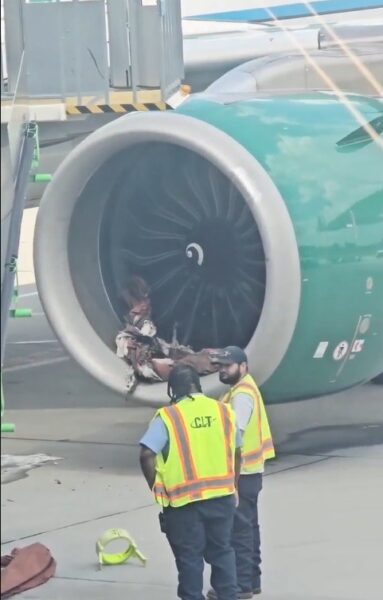Frontier Airlines Incident at Charlotte Airport Highlights Aviation Safety Protocols
Charlotte Douglas International Airport (CLT), one of the busiest travel hubs in the United States, experienced significant delays on August 16, 2025, after a Frontier Airlines Airbus A320neo was taken out of service following a ground equipment issue. While the incident caused inconvenience for travelers, no injuries occurred, and aviation safety measures worked as intended.
What Happened
Frontier Airlines Flight F93134 was preparing to depart Charlotte for New York–LaGuardia when a ground-based air-conditioning hose became entangled with the aircraft’s left engine during pre-departure procedures. The hose was partially pulled in, prompting ground crews and flight staff to halt operations immediately.
All passengers and crew remained safe. The airline removed the aircraft from service for inspection and maintenance in compliance with Federal Aviation Administration (FAA) standards.
Passenger Impact
More than 150 passengers faced a delay of nearly nine hours while a replacement aircraft was arranged. Frontier Airlines provided regular updates, rebooking assistance, and refreshments for affected travelers. While extended waits tested patience, many passengers expressed appreciation that safety was prioritized above schedules.
Airline and Airport Response
Frontier Airlines released a statement emphasizing that passenger safety always comes first. Charlotte Douglas International Airport also confirmed its commitment to rigorous ramp safety protocols, which cover the use of support equipment around aircraft.
The response required cooperation among ground staff, airline maintenance teams, and airport operations. Aviation experts note that this type of coordinated action demonstrates how effectively safety systems function when unexpected challenges occur.
Why Ground Safety Matters
Although most travelers associate aviation risks with flights in the air, much of the safety focus happens on the ground. Areas around aircraft are busy with power units, luggage loaders, catering trucks, and hoses for ventilation or power. If not carefully monitored, even routine equipment can cause complications.
Jet engines are particularly sensitive to foreign objects. For this reason, international safety guidelines from the FAA and the International Air Transport Association (IATA) set strict rules on where equipment can be placed and how engine startups are coordinated.
Broader Context
Incidents like the one at Charlotte are uncommon but not unheard of. Over the years, airports and airlines worldwide have strengthened ramp safety with better markings, communication systems, and modernized equipment. Training and constant vigilance remain key in preventing accidents.
Experts stress that while delays can be frustrating, grounding an aircraft for thorough checks is always the right decision. “This shows how aviation puts safety ahead of schedules,” said aviation consultant Dr. Lauren Matthews. “Passengers can take confidence in the fact that even minor risks are treated with absolute seriousness.”
Key Takeaways
For Airlines and Airports: Ramp safety training, communication, and updated equipment are essential.
For Passengers: Delays often result from precautionary checks that keep air travel among the safest modes of transportation.
Conclusion
The Frontier Airlines delay at Charlotte Douglas International Airport serves as a reminder of the aviation industry’s commitment to safety. While the entanglement of a hose with an engine disrupted schedules, the swift response by crews ensured no harm to passengers or staff.
Air travel remains one of the safest ways to journey worldwide precisely because airlines, airports, and regulators take no chances. For travelers, the message is clear: behind every delay is a system designed to protect lives first, and convenience second.
